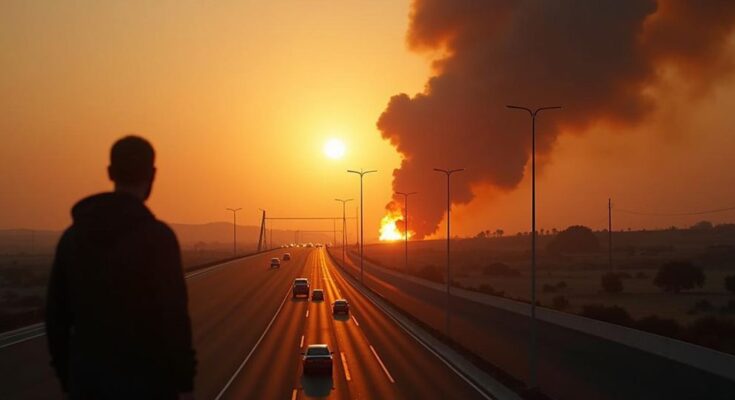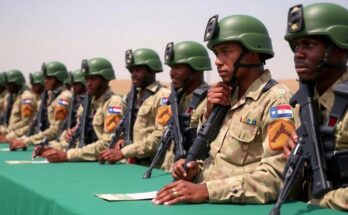An Israeli airstrike has disrupted the main highway linking Lebanon with Syria, contributing to the ongoing military conflict between Israel and Hezbollah. Iran’s Foreign Minister is visiting Lebanon amid escalating tensions, while Australia condemns comments made by the Iranian ambassador regarding Hezbollah. The humanitarian impact on displaced populations is significant as military operations continue to surge.
An Israeli airstrike has severed a crucial roadway connecting Lebanon and Syria, as reported by Lebanon’s state-run National News Agency on Friday. This assault impacted a route adjacent to the Masnaa Border Crossing, a pivotal transit point for numerous individuals fleeing the ongoing conflict in Lebanon, with a significant influx of cross-border movement observed over the past fortnight. Earlier, Israel initiated a ground offensive in Lebanon targeting the Hezbollah militant organization while simultaneously conducting airstrikes in Gaza, resulting in numerous casualties, including women and children. In the southern region of Lebanon, the Israeli military has reported the loss of nine soldiers amid escalating hostilities. The exchanges of fire between Israel and Hezbollah have intensified following Hamas’ cross-border attack on October 7, 2023, which resulted in the deaths of approximately 1,200 Israelis and the abduction of 250 individuals. In retaliation, Israel declared war on Hamas, leading to a significant impact on Palestinian civilians, with more than 41,000 reported fatalities, many of whom were women and children, based on local health officials’ data. The conflict has also claimed nearly 2,000 lives in Lebanon since the onset of hostilities, predominantly since September 23, according to the Lebanese Health Ministry. Simultaneously, Iran’s Foreign Minister Abbas Araghchi is visiting Beirut to engage with Lebanese officials regarding the ongoing conflict dynamics between Israel and Hezbollah. As the primary supporter of Hezbollah, Iran has supplied the group with arms and substantial financial resources. This visit by Minister Araghchi follows a significant Iranian missile attack on Israel, which included at least 180 missile launches, marking a troubling escalation that could lead to broader regional conflict. As part of the ongoing military operations, Israeli airstrikes continued to target multiple locations in Lebanon, encompassing areas such as southern Beirut and parts of the eastern Bekaa Valley. The state-run National News Agency of Lebanon affirmed that the Masnaa Border Crossing had been closed due to the airstrike, marking a significant disruption as it inhibits the already precarious movement of displaced individuals seeking refuge in Syria. Recent statistics indicate that Lebanon’s General Security recorded over 250,000 Syrians and more than 80,000 Lebanese citizens crossing into Syria in the final week of September, coinciding with the onset of Israel’s extensive bombardment of southern and eastern Lebanon. Despite damage to the roadway connecting Masnaa with Jdeidet Yabous in Syria, several border crossings remain operational, with Lebanon’s Minister of Public Works asserting that all crossings are under state supervision. In a separate development, Australian Prime Minister Anthony Albanese denounced comments by the Iranian ambassador that praised a recently slain Hezbollah leader, asserting the government’s position against supporting organizations labeled as terrorist entities. Albanese emphasized Australia’s ongoing diplomatic relations with Iran since 1968 as a strategy aligned with national interests, despite the prevailing disagreements with the Iranian regime. Opposition leader Peter Dutton has called for the expulsion of the Iranian ambassador, criticizing the remarks as inconsistent with Australia’s national security interests.
The ongoing conflicts involving Israel, Hezbollah, and other regional actors have heightened tensions across the Middle East, particularly in the aftermath of the Hamas attack on Israel, which has resulted in extensive military reprisals against both Hamas in Gaza and Hezbollah in Lebanon. The closure of the Masnaa Border Crossing, a significant transit point between Lebanon and Syria, illustrates the disruption caused by military activities and the humanitarian implications for displaced persons. Additionally, Iran’s involvement as a key ally of Hezbollah underscores the complexities of the conflict, as Iranian support for the militant group shapes the regional power dynamics. The escalating military actions and the political repercussions from external actors such as Australia reflect the global dimensions of the conflict.
The recent Israeli airstrike cutting off a major highway between Lebanon and Syria underscores the intensifying conflict in the region, further impacting the flow of displaced individuals fleeing violence. With both Israel and Hezbollah engaged in near-daily exchanges of fire, the broader implications of Iran’s continued support for Hezbollah pose significant risks of an expanded regional conflict. As reactions unfold internationally, including condemnation from Australia, the multifaceted nature of this violence highlights the urgent need for diplomatic resolutions to avert further humanitarian crises.
Original Source: abcnews.go.com




